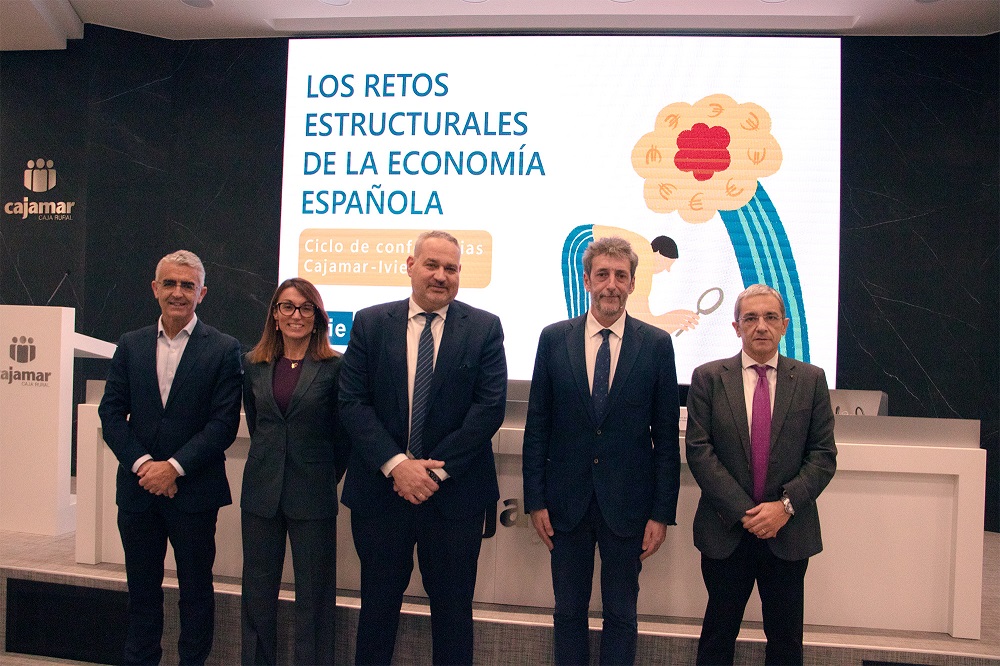Esta web utiliza cookies para que podamos ofrecerte la mejor experiencia de usuario posible. La información de las cookies se almacena en tu navegador y realiza funciones tales como reconocerte cuando vuelves a nuestra web o ayudar a nuestro equipo a comprender qué secciones de la web encuentras más interesantes y útiles.

Martín: “Spain has only 14% of active innovative companies, compared to the European average of 23.4%”
At the inaugural session of the conference series organized by Cajamar and Ivie, economist and Director General of the Center for Technological Development and Innovation (CDTI), José Moisés Martín, highlighted the weak contribution of innovation to Spanish productivity growth
Spain’s productivity performance has been notably poor over the past 30 years. Since 1995, total factor productivity (TFP) has grown by just 5%, compared to nearly 20% in the Eurozone. “Part of this sluggish productivity growth can be explained by the relatively low technological intensity of our economy,” Martín explained during his presentation Innovación, tecnología y productividad en España (Innovation, Technology, and Productivity in Spain) organized by Cajamar and the Ivie in Valencia. He highlighted that the percentage of companies that carry out recurring innovative activity in Spain (i.e., not just occasionally but every year) is well below the European average (14% vs. 23.4%).
Moreover, innovation is distributed very unevenly between large and small companies, as almost 50% of those that invest in innovation have 250 or more employees. “Not only do fewer SMEs innovate, but their innovation intensity is also lower. While large companies allocate more than 1% of their turnover to innovation, small companies (10-49 employees) invest less than 0.7%.” This limited commitment to innovation translates into lower business R&D spending as a percentage of GDP in Spain (0.84%) compared to the European average of 1.47%.
Cajamar’s Regional Director in Valencia, Jesús García, and Ivie Research Deputy Director, Joaquín Maudos, were responsible for inaugurating the series of conferences organized by Cajamar and Ivie in the auditorium of Cajamar’s headquarters in Valencia. The aim of this joint initiative is to encourage reflection and debate on key economic issues, with a particular focus on addressing Spain’s productivity gap.
Martin explained that investment in technology alone is not enough to boost productivity. It must be complemented by investments in intangible assets, such as human capital and organizational capabilities. “Innovation and technology policy must address both ‘hard’ aspects (investment, technology acquisition) and ‘soft’ aspects (human capital, networks, intangibles),” he argued. He also called for greater flexibility in innovation financing mechanisms and emphasized the importance of taking advantage of EU’s Next Generation funds, but warned that the most disruptive technologies require sustained, long-term efforts and advocated for a national consensus on technology, science, and innovation policy in order to move from innovation policy to truly innovative public policies. He also insisted on the need for transparency in information, accountability, and a culture of evaluation in policies aimed at promoting innovation.
This first session marks the start of a 6-part series of free, in-person conferences on structural challenges in the Spanish economy (Los retos estructurales de la economía española), organized by Cajamar and the Ivie in Valencia. Each session will address one of the most important challenges facing the Spanish economy: improving its competitiveness, which requires closing the productivity gap that separates it from other advanced economies. Tackling this issue will require both structural reforms to correct the deficiencies in some markets and greater investment in the variables that influence productivity.


